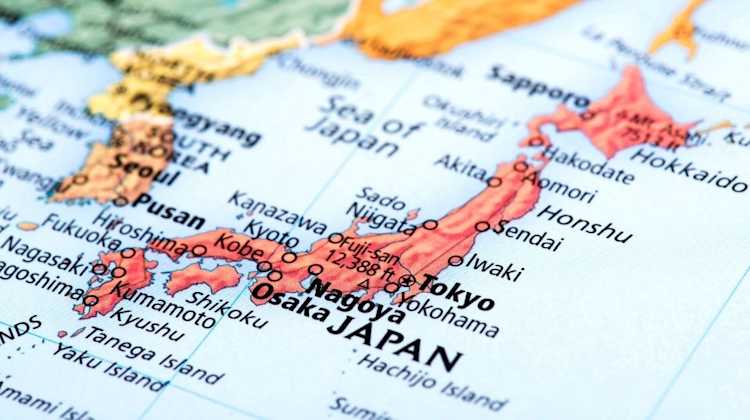Know Before You Go: Japanese Culture
by Noralee Jones - April 25th, 2022

Congratulations! You are headed to Japan!
Well, whether you are excited or not, you may be a little overwhelmed. Don’t worry, that is completely normal. When my family received the orders to PCS to Japan, I had some major mixed emotions. Many people told us about the amazing opportunities we would have, but all I could see was leaving the familiar and going into the unknown.
Japan is truly amazing, but it may feel overwhelming at first. The language is very different, there is a lot of bowing and everyone feels so quiet. There are rules for basically everything--from public transportation, personal transit and owning a vehicle, how to shop, visiting shrines and temples, eating in public and even how late places open and early they close (I miss Target and Starbucks at 10pm!). However, this is an opportunity for so many experiences. So let’s dive into 5 things to keep in mind while living in Japan.
Japanese food and drink
My family is a very “western” family. My children were raised on cereal, oatmeal, chicken nuggets and french fries. So moving to Japan has been a challenge at times when it comes to food, especially eating out.
Many towns and cities in Japan are known for their local specialty, whether it be a type of fish, noodles, seaweed, tofu, or a sweet. It is important to know certain things when you are out trying all these yummy things. Here are four ones I learned the “hard way”.
It is uncommon to have western utensils available at restaurants. Chopsticks are the main utensil for eating, even soup. It is expected for you to eat any solid foods in ramen with chopsticks first and then drink the broth from the bowl afterwards. I am still not great at using chopsticks so I purchased a small set of utensils that I keep in my purse to use if I become stuck while out eating.
Slurping is considered to be polite and a sign of appreciation for the food and the preparer. Don’t be shy!
Never use your hand to catch falling food. This is a huge learning curve for me. This is something I have done from a young age, but a friend of mine, who is Japanese, caught me doing it one day and explained to me that it is considered bad manners.
Never rest your chopsticks on top of your bowl. This is another thing I was taught by my friend. She explained that it shows a lack of respect for the food. Instead, use an official chopstick rest or the paper the chopsticks were in to place the chopsticks when taking a break.
Know some of the language
The Japanese language is quite beautiful, but it is vastly different from English. While there is a lot of English writing on signs throughout many parts of Japan, there are many times where you will come across people who don't speak English. There is only so many mime actions you can do to get by!
Knowing key Japanese phrases can really help you overall. Think about common phrases you need and use in everyday life, and start practicing them in Japanese. Hello, goodbye, excuse me, thank you, yes, no, where is the bathroom, help me, and please are good ones to start with.
Before you go, check if your base library or local public library has audiobooks to help you learn Japanese. This is a free, easy way to familiarize yourself with the language while you are folding laundry or doing other everyday tasks. You can also download apps like Duolingo or LingoDeer to learn basic vocabulary, or use HiNative to ask questions and get answers from native speakers.
Public restrooms were a surprise
The public restrooms in Japan are something that blew my mind. Not only are they so child friendly, but there are specific areas made just for children (smaller toilets, smaller stalls, and lower sinks). Additionally, many of the stalls have locks up high (have you ever had your toddler open the door while you were on the seat?!), toddler seats, and even small seats for toilet training in the adult stalls.
While all that is good and helpful, one thing that gave me a shock was the lack of soap and paper towels. Yes, that is correct. Many restrooms will not have any way to wash your hands other than a sink and faucet. It is common practice for everyone to carry their own paper soap and hand towels (also known as Tenugui). I keep these in my purse or travel bags always, and my kids are now used to just asking for my towel when we are out and about.
Transportation is vastly different in Japan
Public forms of transportation are very, very common in Japan. Additionally, many people walk or ride a bike to get to their destinations. This is due to limited space for parking, narrow roads, and many people living in a small space. Although Americans will be allowed to get a vehicle while in Japan (do not bring your own here, trust me!), taking the train is a great way to navigate around Japan and experience the culture. Remember though, it is vital to stay quiet while on trains. Silence phones (or use ear plugs) and you are not allowed to talk on the phone. Being loud and disruptive on public transport is considered very rude and you can even be asked to leave.
Sort your trash
In many other countries, trash is often classified into three main categories: recyclable, household, and compost.
However, most cities, towns, and villages across Japan categorize and discard waste in a very particular manner. In addition to burnable trash (i.e. paper scraps), combustibles are further separated into smaller categories, including newspapers, magazines, and plastics. Additionally, these must each be disposed of on their designated day. If you live on base, you will have access to cans and bins on base to help you get them sorted. If you live off base, you will have designated places in your neighborhood to put the specific types of waste. Lastly, be aware that there are very limited trash cans out in town. It is recommended to keep a small trash bag in your purse or backpack so you can dispose of your trash when you return home.
Although the culture and traditions of Japan may seem overwhelming at times, I promise you will get the hang of things. Learn some basic phrases to help while you're out in town (Google Translate is also very helpful), embrace getting on a train and navigating your way around, and do not let fear keep you on base all the time. Trust me, it is worth it. There is so much to see, eat and experience. Go and enjoy all that Japan has to offer!






